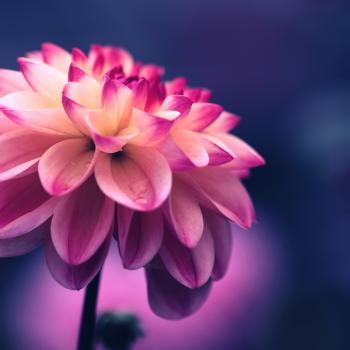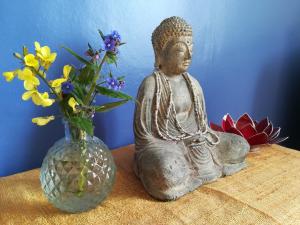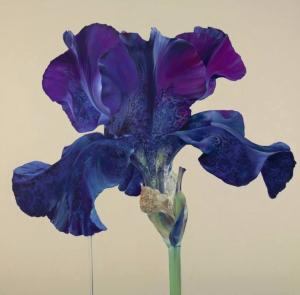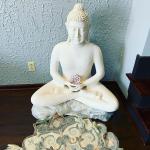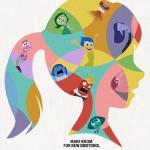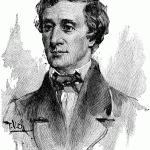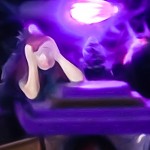
My dream last night was vivid and spooky. I was walking around a pond with my elderly parents. The edges were steep and muddy. All at once, my mum slipped and fell into the pond – I still have an image of her, completely immersed in the murky water. My dad moved towards her and I had the thought, ‘Wait! You’re not strong. Be careful or you’ll slip in and go under too…’
I have been reading Kenneth Tanaka’s book, Ocean, in which he proposes that we should attend to our own spiritual wellbeing before offering to help others. He quotes Jodo Shinshu Priest Rennyo (1415–1499), a descendent of Shinran Shonin who is credited with restoring and popularizing Jodo Shinshu Buddhism. Rennyo said, ‘jishin kyoninshin’, which can be translated as ‘self-benefit and benefitting others’ or ‘receiving Shinjin ourselves and then leading others to receiving it’.
Shinjin is a Pure Land Buddhist term that has many layers but to give you a sense of it we could say it means ‘waking up to the compassion and wisdom of the Universe’. Rennyo seems to be asking us to attend to our own enlightenment, helping ourselves, before we offer spiritual assistance to others. I am curious – is this always true? Here are some suggested questions to guide us.
Are we aware of our own limitations?
My dad has been unwell for some time, and so my dream was accurate in that regard – he did have physical limitations and it was likely that my dream-mum would have pulled him under too. Knowing ourselves and our own limitations is a hugely important part of being a helper. In my experience, this is an ongoing project!
Is it an emergency?
With my mum submerged underwater, we could say that my dream was sharpening the edge of the dilemma we sometimes face. If we are at risk of being pulled under ourselves, should we step forwards? This dilemma applies to physical emergencies but also emotional ones – sometimes our own mental health is fragile, and spending too much of our time helping someone in distress can tip us over the edge. If we become submerged ourselves, we become no good to anyone, and we might even need rescuing ourselves. If it is an emergency, then we might ask questions such as, is it safe for me to help? Could I get extra support to assist me in my helping? Is there anyone else who could help instead?
Why are we helping?
Our helping actions often emerge from a mix of motivations. Some of these will be purely altruistic, and some of them will involve some self-interest – we are human after all. When I help I am sometimes aware of parts of me that have an agenda. Examples are when I want the other person to stop hurting because I am uncomfortable with the intensity of their pain, or I want to be seen by the other person as ‘nice’. Uncovering these self-protective motivations is hugely helpful as we are of much more use to the other person when we only want what is best for them, and we don’t need them to be a particular way in order to be okay.
What does the other person actually want?
It’s easy to get carried away in making offerings without checking to see how our gifts are being received. I have a colleague who often gets into muddles and I used to enjoy providing them with the ‘correct’ information to ‘sort them out’. I recently realised that this didn’t feel good to them – they would rather have got themselves out of their own muddles, and have me treat them as a grown-up instead. If in doubt, ask!
I think that my dream was reminding me to be conscious of my current energy levels and resources before I leap in to offer help. Am I the best person to be offering help at this time? What am I worried might happen if I don’t? I have lots of parts that leap in when someone is in need, and I want to let these parts of me know that they do have a choice.
We all have a responsibility to, as Rennyo said, attend to our own enlightenment before showing others the way. I don’t think he meant that we need to be perfect human beings before we practice generosity – Pure Land Buddhism is clear about how little hope we have of becoming perfect. I do think he is encouraging us to check in before we dive in – for our sake, and for the sake of all beings.
Go gently _/|\_
*
What is your experience of helping? What are your tendencies? How might you practice helping yourself before helping others? What judgements are around? How can you be more gentle with it all?


